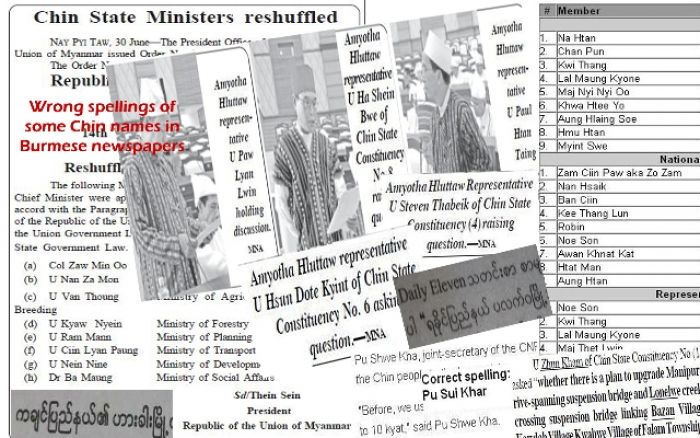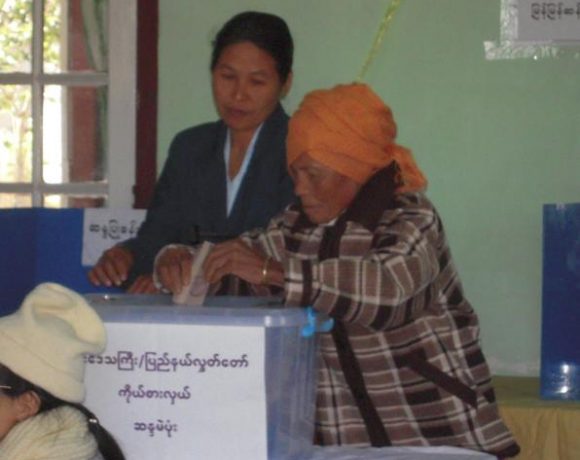Burma must stop distorting and start ‘righting’ ethnic names

16 January 2014: As an ethnically diverse country, the Union of Burma is home to many different nationalities with unique cultural identities and writing systems. They maintain their own characters and literature although Burmese is used as the official language.
Ethnic groups started taking arms against successive military regimes owing to many reasons, one of which is to protect their unique cultural identities against this surreptitious scheme of creating one homogeneous nation of Burmans.
The word ‘Burmanization’ is not new to someone who knows about Burma’s military regimes. It is an unwritten policy of assimilation implemented in an attempt to make ethnic nationalities Burmanized. It takes various forms and shapes including the rape of ethnic women by Burma Army soldiers, killing villagers and burning villages, and banning speaking and publication in ethnic languages.
The year 1989 saw a bizarre change of writings across Burma including the name of the country itself as well as places based on an astrological reading, mostly favoured by the late Ne Win. Bertil Lintner noted in his book Outrage that the decision to Burmanize even local place names was announced on 18th June (1+8=9).
Despite recent makeovers, as Andrew R.C. Marshall put it, with new formats and images in colour, the New Light of Myanmar, the mouthpiece of the military regime and current reformist government, still continues its usage of Burmanized writings when it comes to ethnic names of places and even members of parliament.
The New Light of Myanmar wrongly yet consistently, perhaps intentionally, spells names of Chin MPs such as Paul Thang Thai as Paw Htan Thai and Paul Htan Taing, and Zung Hlei Thang as Zone Hle Htan, and of places such as Kyikha for Cikha, and Yayzwa and Rezva for Rezua. The same had recently happened to Chin athletes representing Burma during the 27th SEA Games.
In President Thein Sein’s official announcement on the reshuffle of Ministers of Chin State, Nang Za Hmung, Chin State minister of Finance and Revenue was written as Nan Za Mon, and Cin Lian Pau, former Chin Minister of Transport, as Ciin Lyan Paung.
Like other ethnic nationalities in the country, the Chin in general, for instance, have a writing system using Roman alphabets, entirely different from Burmese. One of the Chin Christian pastors said: “If we read about Chin State published in the English edition of the New Light of Myanmar, we sometimes don’t know who and where they are writing about because of the unusual wrong spellings of names.”
A University student who is currently studying in the UK said: “When we apply for a Burmese passport, we have to fill in the forms in Burmese. When we get our passport, our name is written in Burmese as well as in English from a distorted translation of our name written in Burmese. My name, originally written in English, becomes unrecognizable.”
Despite its constant practice of falsifying or intentionally ignoring the spelling of ethnic names, the government of Burma furiously reacted over the use of ‘Burma’ rather than ‘Myanmar’ by the US Embassy in its press release in January last year. This is a clear indication that the government strictly keep its eyes on the spelling and writing of names.
Similarly, most, if not all, mainstream Burmese media agencies including those in exile awkwardly follow the same practices in their English edition.
With the premeditated installation of a new government, Burma suddenly said it is changing its course toward democracy with no obvious reasons given. On the surface, it signals an end to sixty years of military dictatorship but not necessarily to that of civil wars until recently. Outwardly, it makes a change of uniforms from military to civilian but inwardly, it still lets the same people lead the country using policies from previous regimes.
A shift of power from Rangoon to Nay Pyi Taw and a change of system from totalitarian to parliamentary have taken a zigzag path supposedly leading to a destination marked not by the peoples but yet by the scion of a ruling family.
Once again, an attempt has been made to reach out to ethnic armed groups for ceasefires to declare the country is at peace. This proves to be true of what the government has not publicly admitted but play-acted a pursuit of finding a solution to the country’s long-drawn crisis – ethno-political problems, which have long been highlighted by ethnic groups.
The time of pretence and negligence must come to an end and it is time to start respecting ethnic values and identities involving their literature if a genuine democratic society is to be achieved in the country.#





